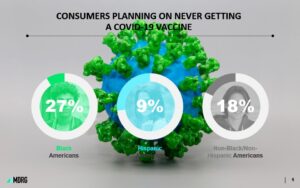For most Americans, there is a sense of relief and freedom associated with being vaccinated from disease. Vaccines offer protection and peace of mind that come from knowing one is safe from severe illness. However, MDRG found that the prospect of a COVID-19 vaccine has shifted consumer sentiment. Feelings of peace and security have been replaced with fear and uncertainty. Many Americans are distrustful of the safety and efficacy of a COVID-19 vaccine and may ultimately refuse to get one.
The sudden distrust Americans have towards a COVID-19 vaccine can happen to any brand or product. Brands should take note of the public’s adverse reaction to the COVID-19 vaccine and not underestimate the role of trust in consumer behavior.
Trust Varies Between Groups
Trust in a brand or product can vary between different consumer groups. MDRG conducted an online survey among 1,019 US residents between the ages of 18 and 81 and when grouped by race, found significant differences in willingness to get a COVID-19 vaccine. Black Americans were significantly more likely to be opposed to getting a vaccine than Hispanic or White Americans. Approximately one in four (27%) Black Americans reported they would never get vaccinated for COVID-19. Far fewer Hispanic and White Americans were opposed to getting a vaccine. Less than one in ten (9%) Hispanic Americans and less than one in five (18%) White Americans reported they would never get a COVID-19 vaccine.

A lack of trust in the safety and efficacy of a vaccine was the main reason respondents were unwilling to get a COVID-19 vaccine. Black Americans’ history with the Tuskegee Experiment may be one reason for their greater levels of opposition to a vaccine. Other races may not have as painful memories, making them more willing to accept a vaccine. It is easier to trust the medical community when you have not been exploited by them.
Branding and Trust
A name communicates a great deal about a brand or product. “Operation Warp Speed” is a catchy name, but it is perhaps better used in the context of zipping through space on the Star Trek Enterprise than creating a new vaccine. The name, which refers to the White House’s plan for creating and distributing a COVID-19 vaccine, inspires feelings of urgency and haste rather than safety.
Due to the quick timeline of Operation Warp Speed, many perceive the COVID-19 vaccine as being rushed, creating doubts about its effectiveness. MDRG found a widespread skepticism around the development of a vaccine. Most consumers plan on waiting to get a COVID-19 vaccine after one becomes available. In the same survey described above, about one in four (26%) Black Americans and roughly one in three Hispanic (36%) and White (31%) Americans reported they would not get a vaccine immediately after it became available. Instead, consumers would rather wait months and risk contracting COVID-19 to see for themselves if Operation Warp Speed produces an effective vaccine.
The rush for a cure also has many worried that mounting political and financial pressure will cloud the judgment of pharmaceutical companies in charge of making a vaccine. Some pharmaceutical companies have tried to combat this impression by pledging to follow vaccine safety standards. This pledge is a step in the right direction in gaining the public’s trust but will not immediately solve the problem. Consumers will need to hear a vaccine is safe and effective from brands or people they already trust. Promises from untrustworthy sources will hardly be convincing.
Transparency to Build Trust
Transparency from those in charge may help build trust. Respondents who are hesitant about a vaccine reported that acts of transparency would help them feel more comfortable getting a vaccine. Respondents mentioned providing to the public a list of ingredients in the vaccine, a list of side effects, or experimental trial results would make them more confident in the vaccine. An open acknowledgment that the pharmaceutical companies producing the drugs are going to be held accountable for the safety of the public was also mentioned. Consumers want proof that the vaccine is safe and effective. Verbal promises are not enough to convince the public to get a COVID-19 vaccine. Because they do not rust those in charge, Americans now want clear evidence they are being told the truth.
A Valuable Lesson
As the public’s response to the COVID-19 vaccine has shown, even the most valuable products can suffer from a lack of brand credibility. Trust between a brand and consumers will matter for some brands more than others. However, it is still important to know where your brand stands.
When analyzing your brand, remember:
- Not everyone will perceive your brand in the same way. Different groups may have different opinions. You should know what they are.
- Your brand may be communicating a message you did not intend to convey. Determine all the different implications of your brand and stamp out the ones that do not fit.
- A lack of transparency can lead to distrust. Consumers can be driven away if they think your brand is untruthful. If you need to build credibility, being honest with consumers will go a long way.
For more information on consumer trust in the healthcare industry, check out our webinar: Health Care’s New Competitive Advantage
Are you eager to stay ahead of the curve in your industry? Sign up for our monthly insights email and gain exclusive access to valuable market research, industry trends, and actionable recommendations delivered directly to your inbox.
Topics from this blog: Healthcare